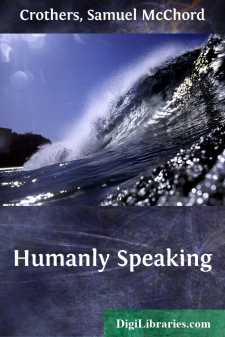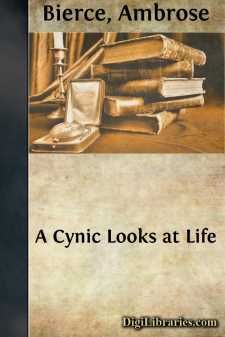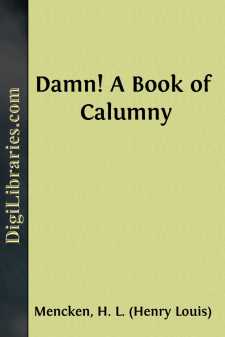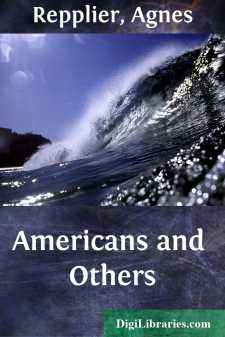Literary Collections
- American 84
- Ancient, Classical & Medieval 14
- Asian 1
- Australian & Oceanian 1
- Canadian 55
- Continental European 121
- English, Irish, Scottish, Welsh 179
- Essays
- General 24
- Letters 46
- Middle Eastern 1
Essays Books
Sort by:
by:
Charles Lamb
ELIA (From the 1st Edition, 1823) THE SOUTH-SEA HOUSE Reader, in thy passage from the BankвÐâwhere thou hast been receiving thy half-yearly dividends (supposing thou art a lean annuitant like myself)вÐâto the Flower Pot, to secure a place for Dalston, or Shacklewell, or some other thy suburban retreat northerly,вÐâdidst thou never observe a melancholy looking, handsome,...
more...
WALKING-STICK PAPERS PROLOGUE ON CARRYING A CANE Some people, without doubt, are born with a deep instinct for carrying a cane; some consciously acquire the habit of carrying a cane; and some find themselves in a position where the matter of carrying a cane is thrust upon them. Canes are carried in all parts of the world, and have been carried—or that which was the forefather of them has been...
more...
HUMANLY SPEAKING "Humanly speaking, it is impossible." So the old theologian would say when denying any escape from his own argument. His logical machine was going at full speed, and the grim engineer had no notion of putting on the brakes. His was a non-stop train and there was to be no slowing-down till he reached the terminus. But in the middle of the track was an indubitable fact. By all...
more...
Jean Valjean The hero is not a luxury, but a necessity. We can no more do without him than we can do without the sky. Every best man and woman is at heart a hero-worshiper. Emerson acutely remarks that all men admire Napoleon because he was themselves in possibility. They were in miniature what he was developed. For a like though nobler reason, all men love heroes. They are ourselves grown tall,...
more...
by:
Hannah More
INTRODUCTION. It is with the utmoÃ
¿t diffidence that the following pages are Ã
¿ubmitted to the inÃ
¿pection of the Public: yet, however the limited abilities of the author may have prevented her from Ã
¿ucceeding to her wiÃ
¿h in the execution of her preÃ
¿ent attempt, Ã
¿he humbly truÃ
¿ts that the uprightneÃ
¿s of her intention will procure it a candid...
more...
LIFE OF EMERSON Ralph Waldo Emerson was born in Boston, May 25, 1803. He was descended from a long line of New England ministers, men of refinement and education. As a school-boy he was quiet and retiring, reading a great deal, but not paying much attention to his lessons. He entered Harvard at the early age of fourteen, but never attained a high rank there, although he took a prize for an essay on...
more...
by:
Ambrose Bierce
I The question "Does civilization civilize?" is a fine example of petitio principii, and decides itself in the affirmative; for civilization must needs do that from the doing of which it has its name. But it is not necessary to suppose that he who propounds is either unconscious of his lapse in logic or desirous of digging a pitfall for the feet of those who discuss; I take it he simply wishes...
more...
PATER PATRIÆ If George Washington were alive today, what a shining mark he would be for the whole camorra of uplifters, forward-lookers and professional patriots! He was the Rockefeller of his time, the richest man in the United States, a promoter of stock companies, a land-grabber, an exploiter of mines and timber. He was a bitter opponent of foreign alliances, and denounced their evils in harsh,...
more...
THE MYSTERY OF JUSTICE 1 I speak, for those who do not believe in the existence of a unique, all-powerful, infallible Judge, for ever intent on our thoughts, our feelings and actions, maintaining justice in this world and completing it in the next. And if there be no Judge, what justice is there? None other than that which men have made for themselves by their laws and tribunals, as also in the social...
more...
by:
Agnes Repplier
A Question of Politeness"La politesse de l'esprit consiste à penser des choses honnêtes et délicates." A great deal has been said and written during the past few years on the subject of American manners, and the consensus of opinion is, on the whole, unfavourable. We have been told, more in sorrow than in anger, that we are not a polite people; and our critics have cast about them for...
more...











